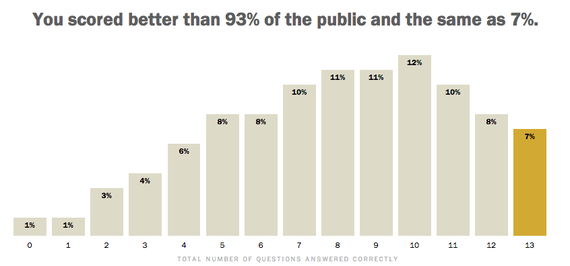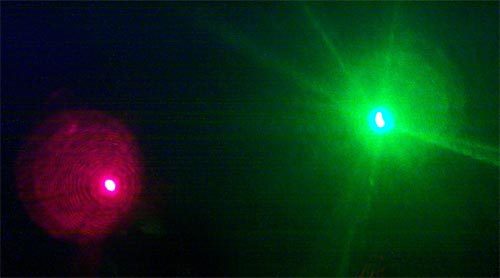
The Pew Research Center and Smithsonian magazine created a quiz to test the public's knowledge of science and technology. In April they published a report summarizing the responses of 1,006 randomly selected adults in a national poll. The scores and individual responses were broken down by age, sex, and education level.
SPOILER ALERT: If you want to take the quiz without knowing the answers, do it before you read the rest of this essay. It's only 13 questions. You can take it online here and see how you score relative to other Americans.
I recently discovered the quiz on Facebook and took it. I got a perfect score. I'm not sure that's much to brag about, since I'm a professional scientist. I probably wouldn't have done as well on a history quiz, and I would have likely failed a sports or pop culture quiz. I asked my 15-year-old daughter to take it to get a second data point for gauging the difficulty. She also got a perfect score, and she answered all the questions in less than two minutes.
The summary report was disappointing on several levels. The lack of basic science and technology understanding of my fellow citizens disturbs me. Maybe my lack of sports or pop culture knowledge bothers others, but that doesn't affect my ability to contribute to the democratic process. I am sufficiently aware of and contrite about my history limitations to seek information when I need it.
One result was beyond disappointment to me, because it reveals more than ignorance about science and technology. It suggests that most Americans have lost the ability to even think. Only 48 percent of Americans got the right answer to a true-false question about the statement "Lasers work by focusing sound waves."
I don't fault people for not knowing that the word "laser" is actually an acronym and the "L" stands for light. I don't expect most Americans to know that photons are light particles that can be stimulated by other photons. But how can anyone not know that light comes out of a laser? This isn't a question that you need science knowledge to answer. Observing, thinking, and using logic should be enough. You can't hear a laser. Lasers shine light.
The number of correct answers on the laser question is worse than random. The only explanation I can come up with is that many people are so uncomfortable with their scientific illiteracy that they assumed it was a trick question and gave an answer that went against their instincts.
There was something that bothered me even more than the laser question, because it revealed more about the quiz creators than it did about the quiz takers. I didn't like this question: "What gas do most scientists believe causes temperatures in the atmosphere to rise?" Why was it posed in a way that fuels the perception that this is simply a matter of opinion (or even worse, "belief")? To be consistent, the other questions should have been worded like this:
- Most scientists believe that the continents on which we live have been moving their location for millions of years and will continue to move in the future. True or false?
After all, there are still scientists who don't accept plate tectonics. Antibiotic-resistant bacteria require evolution, which is rejected by creation "scientists." There will always be crackpot scientists who reject the notion of electrons, atoms, and hemoglobin.
Shame on Pew for giving crackpot deniers of the greenhouse effect more respect on their quiz than they give to creationists and alchemists.
But further reflection leads to a significant bright spot. There are more Americans who know that carbon dioxide traps heat than there are who know that lasers focus light.


